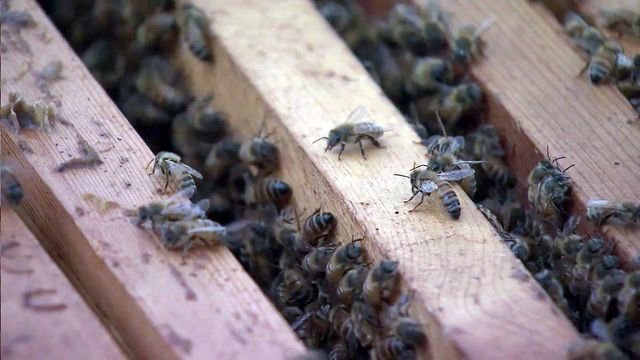NC Senate has honey of idea to boost bees, agriculture
With declining bee populations putting agriculture in North Carolina and nationwide at risk, state lawmakers want to give beehives a boost.
Posted — UpdatedAccording to the U.S. Department of Agriculture, bee colonies have dropped 25 to 30 percent per year in recent years. A mix of parasites, pathogens, pesticides and a lack of diversity in pollen or nectar is blamed for much of the losses.
"Because of housing developments or agriculture as well – clearing out – you don't have the small fields anymore where you would have buffers of plants," said Jen Keller, a research specialist in North Carolina State University's Department of Entomology.
About one-third of the food eaten worldwide requires bees for pollination, and some researchers fear empty supermarket produce aisles and barren farmers markets in the future if the decline isn't reversed.
"With agriculture being our No. 1 business, we've got to make sure we continue to grow, grow, grow and grow a lot more food for people, not just here in this state but across the world," Brock said.
His bill would address some of the loss of habitat Keller noted by requiring state agencies to look for ways to increase and promote highway rights-of-way, utility easements and other areas as places for the flowers and trees that bees need for food.
"One thing that we’re trying to promote is to have buffer zones. Let some of those wild flowers and weeds continue to grow," Keller said.
Senate Bill 225 also would prevent cities and counties from enacting ordinances preventing people from having as many as five backyard beehives.
Keller said she thinks allowing more people to have hives could boost bee populations.
"Instead of one person having 20 hives in one spot, if you have 20 people with one hive (each) spread out, you might conquer more that way," she said.
Living next door to a beehive might make some people nervous, Keller says, but it shouldn't.
"You probably would not know a hive was there unless you walked over and saw the bees coming and going," she said. "They do their own thing, and they really don't care about us. You shouldn't be scared of them."
• Credits
Copyright 2024 by Capitol Broadcasting Company. All rights reserved. This material may not be published, broadcast, rewritten or redistributed.





